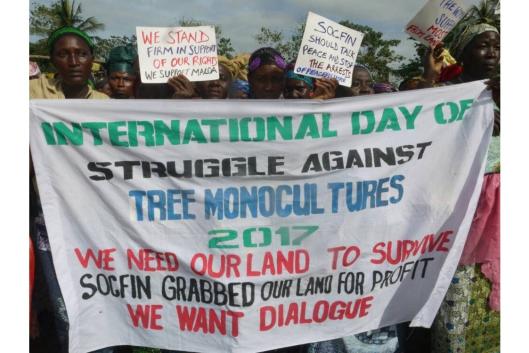On International Women's Day, this bulletin seeks to shine a light on and denounce many of the realities that are generally hidden behind the termed “differentiated impacts” on women who live in and around monoculture plantations.
WRM has been supporting struggles against industrial tree plantations for over two decades. In this process, we have learned about one of the most violent impacts—and at the same time one of the cruelest forms of oppression, exploitation and domination: sexual abuse and violence against women as a result of the establishment of industrial tree plantations. As International Women's Day is celebrated on March 8, with this bulletin we want to help amplify the voices and stories of thousands of women who suffer from this violence; we want to make visible that which is systematically covered up. And we also want to pay tribute to all the women, who—despite adversity—organize, resist, and maintain joy and the hope that another world is possible.
Historical and Systematic Violence
The establishment of the large-scale monoculture production model required imposing tremendous violence against systems of reproduction of life; that is, systems of collective organization, food sovereignty, ancestral knowledge, among many other aspects. Accordingly, this violence was aimed specifically against women, who are a fundamental pillar of community life. It is worth remembering the plantations of yesteryear in the Americas, and the violence against slaves, which in the case of women was extremely brutal.
Activist and writer, Silvia Federici, claims that “capitalism began with a war against women” (1). Her research has shown how, from the beginning, capitalism required destroying those systems of reproduction, in order to create the need for wage labor and market dependence. And of course, in order to destroy the diverse systems of reproduction of life in the expansion of “capitalist development,” an “effective” and persistent method has been the attack, murder, and stalking of women.
Rape, physical and psychological abuse, harassment, persecution, work in exchange for sex, beatings, violated pregnancies, the presence of armed guards in and around their homes and communities, lower wages and longer work days, unpaid work, continuous use of toxic products without protection, deplorable working conditions, impacts on their reproductive and sexual health, the inability to make decisions on issues related to land, loss of access to the land, deprivation of their livelihoods and sustenance—which translates into harder, more intense and more prolonged domestic work—are just some of the termed “differentiated impacts” that industrial plantations thrust upon the bodies and lives of women today.
The growing militarization of these women's daily lives also glorifies violent and aggressive models of masculinity, most of which act with total impunity. This is the same impunity enjoyed by corporations that monopolize fertile lands, contaminate rivers, destroy forests, displace communities and hire private security agents to “protect” their investments.
This daily violence, by the way, is not in conflict with the dealings of international institutions like the World Bank or the United Nations, which strongly influence international politics and advocate expanding the capitalist economy to all corners of the planet. Behind their safeguards, codes of conduct and social responsibility, are the policies and projects that strengthen a system, which since its inception was, and will continue to be, structurally patriarchal and racist.
Nevertheless, in the midst of this context which is so violent towards them, it is women who are taking the reins to organize and mobilize against this encroachment upon their lands and lives. Their role in the resistance is essential and has been the focus of several WRM bulletins (2).
This bulletin features two articles from Indonesia that lay out the systemic abuses that women (and girls) living in and around oil palm plantations must endure. One focuses on the many labor abuses, and the other highlights the more structural violence of these plantations. Similarly, three articles from Cameroon tell us about the situation of women there who are confronting oil palm monoculture. One focuses on the nationwide impacts and abuses caused by the expansion of these plantations; the second is a recount of the specific kinds of violence that are generated, as well as a call for change; and the third is an article-testimony about how a community has lived and resisted since the company SOCAPALM, arrived on their lands. Another article seeks to summarize the cases of two communities—one in Guatemala and the other in Colombia—where women are the ones who most vigorously fight to defend their lands and livelihoods in the face of oil palm plantations. An article from India warns us of the growing expansion of tree plantations through the government offset program, and how women are not only affected by this, but also a pillar of resistance in the country. Another article from Liberia highlights the importance of having a voice in decision-making processes and how women there are organizing to achieve this. Finally, an article from Brazil tells us of the dangers and impacts of women's exposure to agrochemicals, which they must handle as a common task on industrial plantations.
This bulletin is thus a call for direct and radical solidarity with those women who suffer, resist, organize and mobilize against the daily violence and abuse that industrial plantations cause.
(1) "Caliban and the Witch. Women, the body and Primitive Accumulation," Silvia Federici, 2004. You may download the book for free here.
(2) See for example:
Bulletin 211, February 2015: Women in Resistance: Defending Territories and Life.
Bulletin 200, March 2014, The Struggle of Women: Everyone's Struggle.
Bulletin 187, February 2013, Women Resisting.
